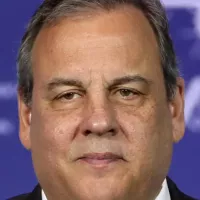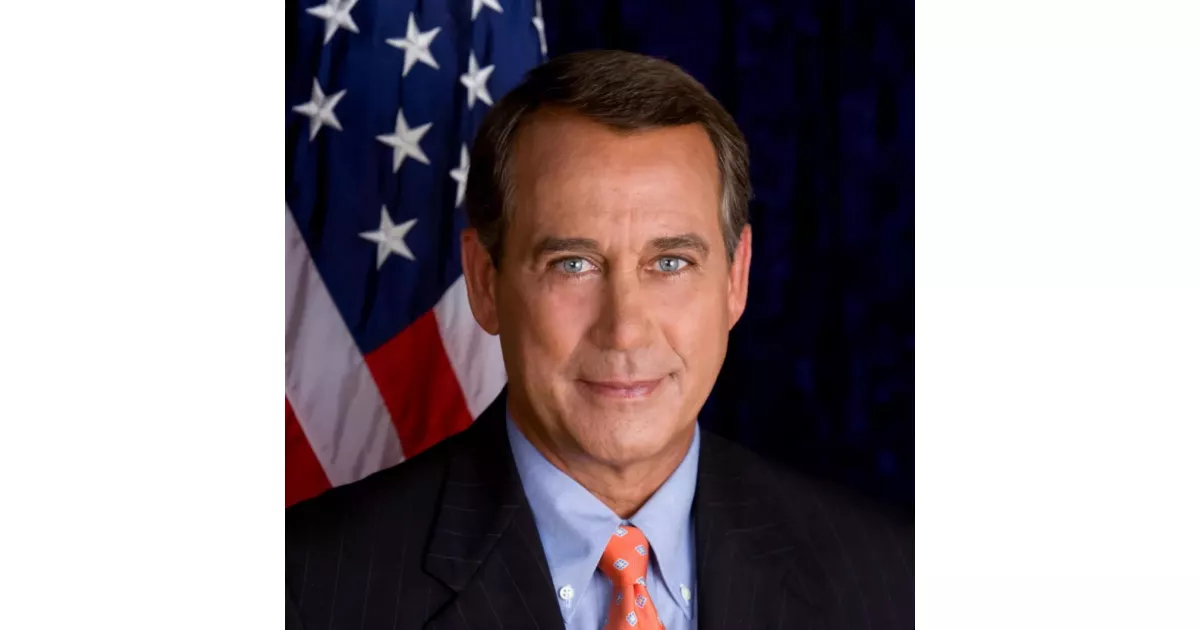John Boehner, a prominent Republican figure, served as the 53rd Speaker of the House from 2011-2015 and represented Ohio's 8th congressional district for 24 years (1991-2015). His district encompassed a mix of rural and suburban communities near Cincinnati and Dayton. As Speaker, Boehner led the House through a period of significant political change and challenges. His speakership was marked by internal party divisions and external pressures related to fiscal policy, healthcare reform, and international affairs. Boehner's tenure also coincided with the rise of the Tea Party movement, a conservative faction within the Republican Party that often clashed with the establishment.
1925: Birth of Earl Henry Boehner
John Boehner's father, Earl Henry Boehner, was born in 1925.
1926: Birth of Mary Anne Hall
John Boehner's mother, Mary Anne Hall, was born in 1926.
1938: Boehner Family Bar Founded
The Boehner family bar, where John Boehner later worked, was founded by his grandfather, Andy Boehner, in 1938.
November 17, 1949: Birth of John Boehner
John Boehner was born on November 17, 1949, in Reading, Ohio.
1968: Graduated from Moeller High School
John Boehner graduated from Moeller High School in Cincinnati in 1968.
1973: Marriage
John Boehner married Debbie in 1973.
1977: Started at Nucite Sales
John Boehner began working at Nucite Sales, a plastics company, shortly after graduating from Xavier University in 1977.
1977: Graduated from Xavier University
John Boehner graduated from Xavier University with a B.A. in business administration in 1977.
1981: Joined Union Township Board of Trustees
John Boehner served on the board of trustees of Union Township, Butler County, Ohio, starting in 1981.
1984: Left Union Township Board of Trustees
John Boehner finished his service on the board of trustees of Union Township in 1984.
1985: Elected to Ohio House of Representatives
John Boehner was elected to the Ohio House of Representatives in 1985.
1990: Left Ohio House of Representatives
John Boehner concluded his term in the Ohio House of Representatives in 1990.
1990: Resigned from Nucite Sales
John Boehner resigned from his position at Nucite Sales in 1990 after being elected to Congress.
1990: First Congressional Election
John Boehner won his first Congressional election in 1990, defeating incumbent Buz Lukens.
1990: Death of Earl Henry Boehner
John Boehner's father, Earl Henry Boehner, passed away in 1990.
1991: Elected to the U.S. House of Representatives
In 1991, John Boehner began his tenure as a U.S. Representative for Ohio's 8th congressional district.
1994: Contract with America
John Boehner, along with Newt Gingrich and other Republicans, helped engineer the "Contract with America" in 1994, which contributed to the Republican Party winning a Congressional majority.
June 1995: Boehner Distributes Campaign Contributions on House Floor
In June 1995, John Boehner distributed campaign contributions from tobacco industry lobbyists on the House floor, while members were considering votes on tobacco subsidies. He later expressed regret for this action, noting it was not against House rules but acknowledging it was inappropriate.
1995: House Republican Conference Chairman
John Boehner became the House Republican Conference Chairman in 1995.
1996: Boehner Acknowledges Regret Over Campaign Contributions
In a 1996 PBS documentary, John Boehner admitted his regret over distributing campaign contributions on the House floor in 1995, despite it not violating House rules. He later led efforts to change the rules to prohibit such practices.
1997: Attempted Coup against Newt Gingrich
In 1997, John Boehner participated in an attempt to oust Newt Gingrich as Speaker of the House.
1998: Loss of Conference Chairman Position
Following the 1998 elections, John Boehner lost his position as House Republican Conference Chairman.
1998: Death of Mary Anne Boehner
John Boehner's mother, Mary Anne Boehner, passed away in 1998.
1999: End of Term as Conference Chairman
John Boehner's term as the House Republican Conference Chairman ended in 1999.
2001: Chairman of the House Education and the Workforce Committee
John Boehner became Chairman of the House Education and the Workforce Committee in 2001.
2001: Co-authored No Child Left Behind Act
John Boehner co-authored the No Child Left Behind Act with Senator Ted Kennedy in 2001.
2002: No Child Left Behind Act Signed into Law
President George W. Bush signed the No Child Left Behind Act, co-authored by John Boehner, into law in 2002.
2005: Elected House Majority Leader
John Boehner was elected House Majority Leader in 2005 after Tom DeLay resigned.
May 25, 2006: Boehner Defends Agenda and Criticizes Democrats
On May 25, 2006, John Boehner issued a statement defending his agenda while criticizing Democrats, including Nancy Pelosi, on national security issues. He accused the Democratic Party of lacking a national security policy and being willing to concede in Iraq.
2006: Became House Minority Leader
After Republicans lost control of the House in the 2006 elections, Boehner became the House Minority Leader.
2006: Left House Education and the Workforce Committee
In 2006, John Boehner finished his service as the Chairman of the House Education and the Workforce Committee.
2007: House Minority Leader
John Boehner became the House Minority Leader in 2007.
September 18, 2008: Boehner Attends Financial Crisis Meeting
On September 18, 2008, John Boehner attended a closed meeting with congressional leaders and key financial figures to discuss legislation for aiding troubled banks. That same day, he liquidated an equity mutual fund position before trades took effect the next day.
October 3, 2008: Vote on TARP
On October 3, 2008, John Boehner voted in favor of the Troubled Asset Relief Program (TARP), believing that Congress had the authority to purchase assets from financial institutions.
2008: Ranked 6th Most Powerful Congressman
In 2008, John Boehner was ranked as the 6th most powerful Congressman by Congress.org.
2008: Republican Nominee for Speaker
John Boehner was the Republican nominee for Speaker of the House in 2008, losing to Nancy Pelosi.
2009: Opposition to Obama's policies
In 2009, John Boehner opposed President Obama's stimulus package and budget proposal. He advocated for an alternative economic recovery plan and a spending freeze, including entitlement programs.
July 2010: Criticism from President Obama
In July 2010, President Obama criticized Boehner, accusing him of not valuing jobs like police officers, firefighters, and teachers.
November 2010: Boehner Calls for Cancellation of Smithsonian Exhibit
In November 2010, John Boehner, along with Minority Whip Eric Cantor, called for the Smithsonian's National Portrait Gallery to cancel an exhibit featuring a controversial video. The video included an image of a crucifix with ants crawling on it, prompting Boehner's spokesperson to warn of scrutiny from the new House majority.
November 17, 2010: Boehner Chosen as Speaker Nominee
On November 17, 2010, John Boehner was unanimously selected by the House Republicans as their nominee for Speaker of the House. This decision virtually guaranteed his election to the position when the new Congress, with a Republican majority, convened in January 2011.
2010: Opposition to Democratic Initiatives
In 2010, Boehner was highly critical of the Democratic Congress and President Obama's initiatives, including "cap and trade" and the Affordable Care Act. He stated his intention to defund the Affordable Care Act if Republicans took the House.
January 5, 2011: Boehner Becomes Speaker of the House
On January 5, 2011, John Boehner received the gavel from outgoing Speaker Nancy Pelosi, officially becoming the Speaker of the House. Boehner was the first Speaker from Ohio since Nicholas Longworth and J. Warren Keifer, and the first to have served as both majority and minority floor leader for his party since Sam Rayburn.
January 2011: Re-elected as Speaker of the House
In January 2011, John Boehner was re-elected to his position as Speaker of the House.
2011: Support for "No Taxpayer Funding for Abortion Act"
In 2011, Boehner prioritized the "No Taxpayer Funding for Abortion Act".
2011: Elected Speaker of the House
John Boehner was elected as the 53rd Speaker of the United States House of Representatives in 2011.
January 1, 2013: Boehner Criticized for Adjourning Without Passing Relief Bill
On January 1, 2013, after passing the fiscal cliff deal, John Boehner adjourned the House without passing the $60 million Hurricane Sandy relief bill. This action led to harsh criticism from Representatives, particularly from the Northeast, and New Jersey Governor Chris Christie.
January 3, 2013: Boehner Re-elected as Speaker
On January 3, 2013, John Boehner was narrowly re-elected as Speaker of the House at the start of the 113th United States Congress. He secured 220 votes, surpassing the 214 needed to win the position.
June 2013: Boehner Labels Snowden a Traitor
In June 2013, John Boehner publicly labeled Edward Snowden, the former NSA contractor responsible for major leaks, as a traitor after the leaks became public knowledge.
2013: Defense Spending Freeze Proposal
In 2013, Boehner led a strategy to freeze Defense spending to avoid reducing the deficit with revenue increases.
May 29, 2014: Boehner Criticizes Climate Change Regulations
On May 29, 2014, John Boehner expressed skepticism about climate change science and criticized proposed federal regulations on coal-fired power plants during a press conference.
July 2014: Boehner Moves Forward with Lawsuit Against President
In July 2014, John Boehner advanced a lawsuit against the President to enforce penalties on companies not providing healthcare coverage for employees. This move followed his push for legislative changes to delay the healthcare mandate the prior year.
November 2014: Boehner's Lawsuit Filed
By November 2014, the third law firm selected by John Boehner filed a lawsuit after he criticized President Obama's unilateral immigration policy moves. This legal action was part of Boehner's ongoing efforts to challenge the administration's policies.
2014: Boehner Faces Opposition Following Mid-term Elections
Following the 2014 mid-term elections, many Republicans expressed a desire for a new House Chairman, with a survey indicating 60% of respondents preferred a change. Despite this, John Boehner retained his position, though he removed dissenters from influential committees.
September 25, 2015: Boehner Announces Resignation
On September 25, 2015, John Boehner announced his decision to resign as Speaker of the House and leave Congress by the end of October 2015. This announcement came a day after Pope Francis' address to Congress, which Boehner considered the pinnacle of his legislative career. Boehner's resignation was influenced by growing discord and controversy over funding Planned Parenthood.
October 8, 2015: McCarthy Withdraws Candidacy for Speaker
On October 8, 2015, Kevin McCarthy withdrew his candidacy for Speaker of the House, citing his inability to lead the fractured Republican Conference. Following this, John Boehner continued as Speaker until a successor was elected.
October 2015: Resignation as Speaker of the House
John Boehner resigned as Speaker of the House in October 2015 due to internal opposition within the Republican party.
October 29, 2015: Paul Ryan Elected as Speaker
On October 29, 2015, John Boehner presided over the election of Paul Ryan as the new Speaker of the House, marking his final act as Speaker. Boehner had initially stayed on after McCarthy's withdrawal to ensure a smooth transition.
October 31, 2015: Boehner Resigns from Congress
John Boehner's resignation from Congress became official on October 31, 2015, at 11:59 p.m. This marked the end of his tenure as Speaker of the House, as he stepped down amidst party challenges and leadership transitions.
2015: Resigned from Congress
John Boehner resigned from his position as Speaker of the House and his seat in Congress in 2015.
May 15, 2016: Laetare Medal
On May 15, 2016, Boehner was awarded the Laetare Medal by the University of Notre Dame.
September 15, 2016: Joins Reynolds American Board
Boehner joined the board of tobacco company Reynolds American on September 15, 2016.
September 2016: Joined Squire Patton Boggs and Reynolds American
In September 2016, Boehner joined the lobbying firm Squire Patton Boggs and became a board member of Reynolds American.
February 23, 2017: Prediction on Affordable Care Act
On February 23, 2017, Boehner predicted that Republicans would "fix" the Affordable Care Act and rename it.
2018: Joins Acreage Holdings Board
In 2018, Boehner joined the board of cannabis corporation Acreage Holdings.
2019: Chair of National Cannabis Roundtable
In 2019, Boehner became chair of the National Cannabis Roundtable.
August 17, 2020: No Endorsement in 2020 Election
On August 17, 2020, Boehner stated he would not endorse either Trump or Biden in the 2020 election, but later confirmed he voted for Trump.
April 13, 2021: Publication of Memoir
On April 13, 2021, Boehner's memoir, "On the House: A Washington Memoir", was published, criticizing several political figures and the Tea Party movement.
October 2023: Vote for Speaker of the House
In October 2023, Boehner received one vote for Speaker of the House after Kevin McCarthy's removal.
2023: Criticism of Trump and the January 6th Attack
In 2023, Boehner criticized Trump's role in the January 6th Capitol attack and called on the GOP to move on from Trump.
Mentioned in this timeline

Nancy Pelosi is a prominent American politician notably serving as...

Pope Francis served as the head of the Catholic Church...

George W Bush the rd U S President - is...
The Affordable Care Act ACA also known as Obamacare is...

Chris Christie is an American politician who served as the...

Ted Cruz born Rafael Edward Cruz is an American politician...
Trending
28 minutes ago Ski Mountaineering to Debut at Milan-Cortina Winter Olympics in 2026.

1 hour ago Selena Gomez's Spiced-Plum Manicure and TikTok Clone Theory Spark Buzz

1 hour ago Kit Harington and Sophie Turner Gag After On-Screen Kiss in New Movie

1 hour ago Trump administration updates, Iran nuclear efforts, and White House controversies unfold.

1 hour ago Dario Amodei Highlights India's Central Role in Shaping AI's Future at AI Summit.

2 hours ago Yoon Suk Yeol, South Korean ex-president, receives life sentence for insurrection and martial law.
Popular

Jesse Jackson is an American civil rights activist politician and...
Randall Adam Fine is an American politician a Republican who...

Pam Bondi is an American attorney lobbyist and politician currently...

Barack Obama the th U S President - was the...

Martin Luther King Jr was a pivotal leader in the...

Ken Paxton is an American politician and lawyer serving as...
